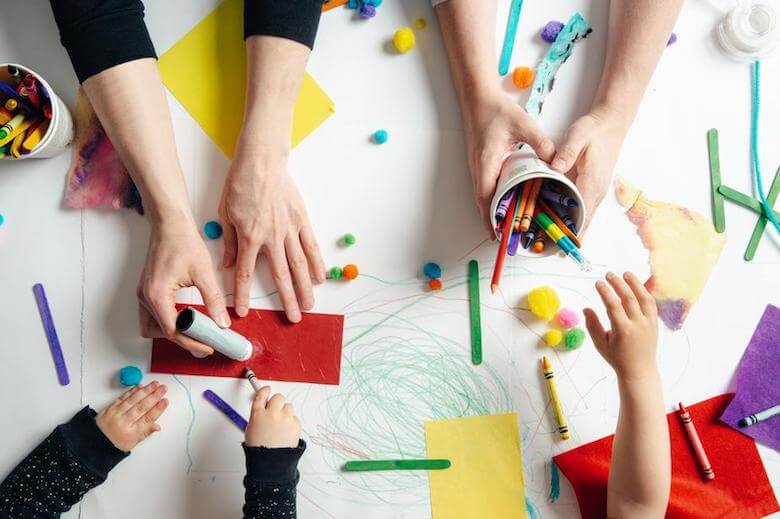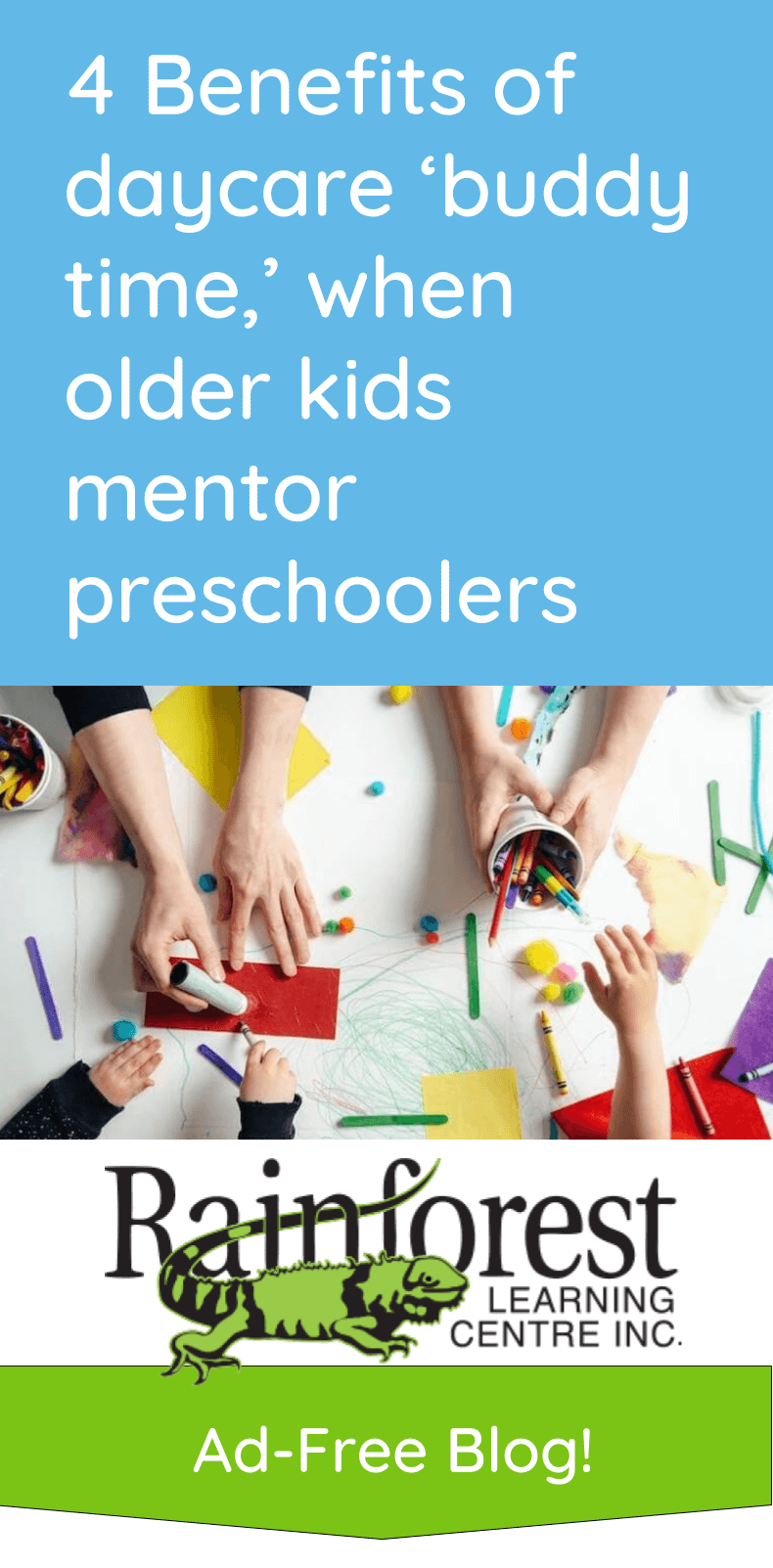
Daycare doesn’t always mean a classroom full of toddlers and preschool-age kids. It can mean before and after school care too, which means older kids are involved too. At our daycare centres, we implement buddy times, when older kids mentor preschoolers. We do this for a reason; it has many benefits to both the older kids and younger kids at our centres. We thought we’d write an article to explain these benefits. So, here goes!
1) Younger children learn to model older children, and older children learn exemplary behaviours
You know that daunting feeling when you, as a ‘grown up,’ gives a child an instruction, and the child just doesn’t want to listen? Well, lo and behold: kids like copying other kids – especially older kids. So, buddy time at daycare can help to instil model behaviour. Kids may not want to listen to you (even if they do, grudgingly). But they certainly want to impress their role models.
With regular ‘buddy time,’ older kids learn to be examples to the preschoolers. This teaches them responsibility and encourages maturity. It instills the lesson that they are certainly being observed. In other words, their actions do affect others.
Young mentors don’t learn this automatically though! Buddy systems are not the sudden ‘release’ of big kids into small kid classrooms! Childcare providers and teachers do need to spend time educating older kids on how to be mentors. This should happen without overwhelming the big kids. Remember, they are still kids.
On the flip side, the younger preschool-age kids can learn that obeying teachers, following their routine, participating in an activity or showing empathy are all positive behaviours that result in positive consequences. They learn from watching peers, in a way, instead of by ‘text book’ knowledge alone.
2) Competitiveness is reduced, and children learn to help and encourage one another
Another interesting thing that begins to take place when older kids mentor preschoolers, is the reduction of competitive atmospheres. Of course, some competition is healthy. But too much competition can take away from the fun in games.
However, as this Psychology Today article explains, competitiveness usually occurs among peers of the same age group, when they usually also have the same abilities. But, when you introduce mixed-age play, the nature of games begins to change. Older kids may start to purposely not play as ‘strongly’ as they could, to help encourage the younger kids. This makes the game fun, instead of being all about winning. And, the younger kids get to develop their skills with positive reinforcements.
Clearly, this can form a sense of empathy and community in the daycare. The older kids start to take care of the younger kids, instead of seeing them as nuisance players that just can’t keep up with their skill level.
3) Preschoolers get a chance to try challenging tasks they may be ready for
We can say that generally, kids of the same age group tend to have similar skill sets, and developmental progress. However, educator working in a classroom can tell you that this is not going to be true 100% of the time. There will always be ‘the curve’ – where you see some kids excelling in certain tasks, whereas others may lag behind. In some ways, this can be attributed to the theory of multiple intelligences. Or, it can be that some kids are just plain gifted.
So, how do you keep those more advanced preschoolers challenged, while not skipping ahead too far with the other kids? Buddy systems are one great solution. They also prevent a situation where one kid is isolated for being ‘too smart’ or not smart enough. This is because a daycare-wide buddy system involves everyone.
As we mentioned above, older kids who are being trained as mentors will probably slow themselves down for the younger kids. But there is another side to this: the younger kids who can function at higher levels will get the ‘push’ they need. That is, they will get time to engage with peers who are using higher-level skill sets.
4) Older kids learn subjects better when they have to teach it to younger kids
Around the web, you’ll find many quotes about how we can remember what we’ve learned. Many are incorrectly attributed, repeated, modified, extracted from old proverbs and so on. They’ve also been debunked.
But despite all that, the main point is this: experience tells us that when we have to teach a subject, we remember it better than if we only learn it. And this can work with students especially.
Applying that concept to buddy time at daycare or preschool, educators can expect that older kids will get more out of their studies when they are brought in as co-teachers. They will be forced to reflect more on what they’ve learned. To teach requires making sense of it. This way, they can re-explain it, in their own words, to a crowd with much lower levels of understanding. This is the action of applying and using their knowledge too, which is a memory retention strategy.
This can be a great way to grow the self confidence of older kids. When they are given responsibility, they can see the result of their efforts right away. It can be a gratifying feeling to know they’ve helped someone else, and that they truly can have an impact on others.
For the younger kids, well, they get to learn from the ‘cool’ big kids! Surely they’ll be engaged, and want to absorb that information too! (We hope!).
To conclude: ‘buddy time’ with preschoolers and big kids at daycare benefits everyone
As we’ve seen above, the benefits of ‘buddy time’ by implementing big-kid-small-kid mentorship programs can be far-reaching. It can help to mature the older kids, while encouraging the little kids to learn from role models. It can also create positive, collaborative environments in the entire school or daycare. We encourage you to give it a try, if you haven’t already!
See more on our blog:
- 3 ways early childhood educators can help kids get along and feel included
- What is normal emotional intelligence in toddlers and preschoolers?
- An approach for teaching preschoolers about race and diversity in Canada
- Community service learning ideas for early childhood education and daycare
- 4 Benefits of before and after school care programs for kids
